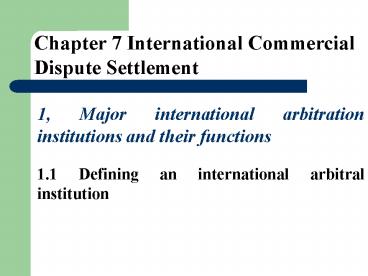1, Major international arbitration institutions and their functions PowerPoint PPT Presentation
1 / 20
Title: 1, Major international arbitration institutions and their functions
1
Chapter 7 International Commercial Dispute
Settlement
1, Major international arbitration institutions
and their functions 1.1 Defining an
international arbitral institution
2
Chapter 7 International Commercial Dispute
Settlement
The international arbitral institution is an
arbitral body which provides arbitral services
for settling international disputes.
3
Chapter 7 International Commercial Dispute
Settlement
1.2 Major governmental international arbitral
bodies Governmental arbitral institutes
are those international arbitral bodies
established under international treaties.
4
Chapter 7 International Commercial Dispute
Settlement
the Inter-American Commercial Arbitration
Commission, ICSID and the Iran--US Claims
Tribunal.
5
Chapter 7 International Commercial Dispute
Settlement
ICSID provides conciliation and arbitration
services to the contracting parties and their
nationals. However, it deals only with disputes
arising directly out of an investment between a
contracting state or its agency and a national of
another contracting party. The jurisdiction of
ICSID is as follows
6
Chapter 7 International Commercial Dispute
Settlement
First, the dispute must be relevant to an
investment, whether direct or portfolio,
including an investment by a licensing agreement,
but excluding disputes from other types of
commercial relationships (as defined in the
UNCITRAL Model Law).
7
Chapter 7 International Commercial Dispute
Settlement
Second, the dispute must arise between a
government authority or agent and a national of
another contracting party thus excluding disputes
between two contracting states or between the
nationals of different contracting parties.
8
Chapter 7 International Commercial Dispute
Settlement
The Iran--US Claims Tribunal is a special
body established for dealing with disputes
between Iran and the United States. It suggests a
particular model of international arbitration for
resolving commercial and non-commercial disputes.
9
Chapter 7 International Commercial Dispute
Settlement
1.3 Major non-governmental international arbitral
institutions Arbitration as a service
10
Chapter 7 International Commercial Dispute
Settlement
Non-governmental international arbitral
institutions have thrived in recent years. Given
that the fundamental principle of arbitration is
the parties' freedom to choose the forum, the
rules and the arbitrators, the popularity of any
private-based arbitral institutes in the world
today can only be explained by their credibility
reliability and convenience.
11
Chapter 7 International Commercial Dispute
Settlement
The International Chamber of Commerce The ICC's
International Court of Arbitration was
established in Paris in 1923, initially under the
name of the Court of Arbitration. The court
provides conciliation and arbitration services
under its own rules. Since 1999, it has handled
more than 500 requests for arbitration per year.
12
Chapter 7 International Commercial Dispute
Settlement
The main features of the ICC are as follows
The court 'does not itself settle disputes'
article 2(1).
13
Chapter 7 International Commercial Dispute
Settlement
The actual arbitral tribunal consists of either
one or three arbitrators, appointed by either the
disputing parties or the court pursuant to its
rules.
14
Chapter 7 International Commercial Dispute
Settlement
The disputing parties' written agreement to
submit the dispute to the court is the
prerequisite for the court's jurisdiction.
15
Chapter 7 International Commercial Dispute
Settlement
Arbitral proceedings under the court commence
from the date on which the written request is
received by the Secretariat of the court.
16
Chapter 7 International Commercial Dispute
Settlement
Although there are rules governing the
statement of defense and counter-claim, there are
no specific rules on evidence, hearings,
amendment of claim and legal representation.
17
Chapter 7 International Commercial Dispute
Settlement
The power of each tribunal in a given case is
defined by the agreement of the parties and the
tribunal has discretion in determining procedural
issues within its power.
18
Chapter 7 International Commercial Dispute
Settlement
The tribunal has power to determine the costs
of arbitration and its awards are final.
19
Chapter 7 International Commercial Dispute
Settlement
2, Dispute settlement within the WTO 2.1 Dispute
settlement mechanism
20
Chapter 7 International Commercial Dispute
Settlement
2.2 Functions of the DSB 2.3 General procedures
of dispute settlement under the DSU 2.4
Consultation under the DSU

